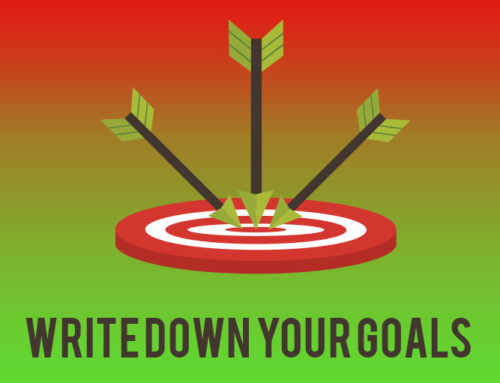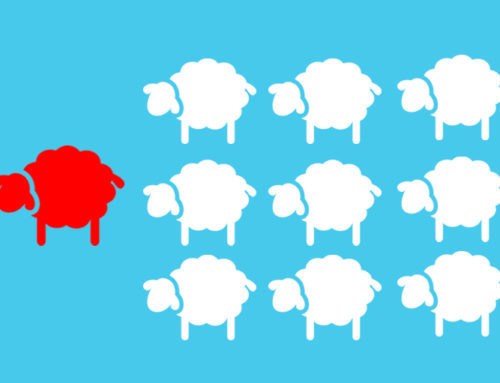What’s really impressive, aside from the turn around time (though, I’ve come to realize it isn’t actually that big of a deal)—is just how much income I generated from that one title. It was so successful at the time that I ended up writing another volume, then I eventually sold the rights to another publisher and moved on with my life towards other goals.
You may be thinking, “There’s no way in f&%# I can do that…” And you’re probably correct, well, at least if you believe that to be a fact. I can assure you, you’re going to be your biggest stumbling block in your life. People who blame their parents, siblings, friends, co-workers, employers, other races or groups from a given demographic—are blaming the wrong people for their personal failures in life. Note I said personal failures—and that should sufficiently clue you in on who you need to blame when things don’t turn out how you want them to.
“Whether you think you can, or you think you can’t—you’re right.” —Henry Ford
I’m fairly convinced Mr. Ford’s thoughts there apply to any goal in life to be honest. If you aren’t willing to believe in yourself, why should others? Me personally, I don’t have to know you to know you can write a book in seven days just like I did—barring any legitimate handicap that may prohibit the process. But even with a disability, there are ways around it. I’m not the sharpest crayon in the box, and I managed it—so I’m guessing you could to.
So here’s my advice for doing it:
Step 1. Decide you actually want to do it
This may sound obvious, but if you don’t actually decide this is something you want to do—you’ll never do it. If you’re an existing author (or you’ve spent a lot of time in academia), this may be a little easier for you to do than someone just starting out for the first time (or who has never or no longer spends any time in front of a computer writing), because you’ll already be familiar with process and discipline required to make a go of it. But you don’t actually have to have written a book before to write one now. Remember, every author starts out as a wannabe. What you do have to be is committed. Deciding you’re gonna do it is probably the most important part of this process. The rest, as you will find out, is’t all difficult as much as it is just time consuming and a little tedious.
Step 2. Pick a topic you know very well
Before you start writing about something random—just stop right there. The key to speed is writing about something you’re very familiar with. The best writers spend time writing about things their passionate about and know intimately. Sure, there are exceptions like journalists who may get random assignments and have to turn things around quickly, but generally speaking—even they write in a genre they’re familiar with. Think about your hobbies. Consider work. Maybe your family history or things you experienced growing up. Me, I pick non-fiction.
Step 3. Before you write a word, plan it out
One of the most important lessons I learned writing a book with a major publishers was how to be properly organized, and that starts in large part with the structure of the book—the table of contents. I use a word doc (you can use Google docs for free) and create a outline of the book broken down into chapters. It’s actually very easy to do. Recently, I sent a template to a friend I’m mentoring and he made one for his first book idea in about an hour.
Once you have the raw structure outlined, you can break that down even more into subsections for each chapter. I personally try to create at least 10 chapters in every book, with a goal of having 10-20 pages per chapter in the finished product. I seldom do less than that, but may do more. The reason is simple, anything less feels a bit light and cheap. If people pay $15-20 for a book, they like some heft. If you write more than that, you start having to look at printing costs, shipping costs, et cetra. There’s a trade off and it does reduce the money you will ultimately make—depending upon the model of publication.
I use Word to write most things (articles, papers, proposals, books), but I’ve begun spending a lot more time using Adobe Indesign with mock-up chapters because I can see the book begin to take shape. As a publisher (both of my own material and that of others), I think a lot more about the “look and feel” of content I produce than I ever did before when I worked with traditional publishers. If you write each chapter in Word with normal margins, 12pt text, single spaced you’ll get one or two full pages for a real book from each single Word page. You can also create margins that are about the same size as the interior pages of a book (final trim of 5.5×8.5, 9×6, or whatever) and that will help you gauge how much you’re writing as you type.
But that won’t happen if you don’t plan things out first.
Step 4. Test how fast you can create pages
Inline with planning, figure out how much content you can write in a single day. For me, I use a split-keyboard and can type (without looking down) somewhere between 65-80 words per minute. That depends on how many Red Bulls I’ve had that day too, of course. If you you’re writing about something you know well, such as from memory, it comes a lot faster than if you’re having to piece it together from research. Sit down and figure out how fast you can put it to paper—so to speak. If you can write 10 full pages in Word in one single day, that means you can probably produce 10-20 interior pages in a finished book per day.
Do the math now—that’s 70 to 140 pages, give or take. In fairness, a 140 page book isn’t bad.
Get it? If you can meet those kinds of numbers—you can write enough content for a full book in a week. No problem.
I know I can write about 15-20 pages of solid content in a single day, which means I produce upwards of 200 pages every 7-days if I format the pages correctly. My finished books tend to use 11pt per line and I prefer finished trim of 5.5×8.5 for trade paperback and 6×9 for hardback. My biggest stumbling block is not being able to produce good content quickly, it’s in being far too critical of the content I produce. That naturally slows the process down. Which brings me to the next step.
Step 5. Do NOT go back to edit or stop writing
Since you have a plan—stick to it. Do not, under any circumstances, go back and try to edit things or make them better. Books are written in phases and editing (at least beyond the most superficial levels) is best saved until after the book is finished. I promise you that you’ll have plenty of time to edit afterwards, not to mention, all of the help you’ll want to enlist to make sure you don’t miss things. The point here is in writing the book in one week, which you’ll not be able to do if you keep going back, stopping, and re-starting again. Trudge through my friend and keep your eye on the price—writing your book in no more than seven days!
Step 6. Block time and ensure you can’t be interrupted
You’ll probably only be able to do this if you block a week out for the project. Just how it’s gonna have to be. I’m self employed (and I was at the time I did this), so it’s a bit easier for me to take 7 consecutive days out of my life on something like this than someone working a full time gig 40-70 hours a week.
If you’re in-between jobs (like J.K. Rowling was when she authored the first of the Harry Potter series), that’s the perfect time to use your freedom for something special like this in your life. Of course, you could take your accrued vacation time (or take unpaid leave) and invest it in your book instead of sitting around the house or going somewhere tropic and doing absolutely nothing—if you’re so inclined. In other words, there are options.
No matter when or how you get there though, you need to make sure you can focus on the task at hand. That means telling your loved ones or friends to keep away unless it’s an emergency. Turn off your phone, kill social media, and only use the internet if you need it to help with the writing of the book. Period.
Step 7. Stop dreaming and start doing
This isn’t Disney. Life isn’t a fairytale. Dreams don’t really ever come true—goals do. Thus, if this is an actual goal you’d like to accomplish, then make it happen. Shut up. Stop talking. Stop procrastinating—and go for it. Do.
“Do. Or do not. There is no try.”—Yoda






